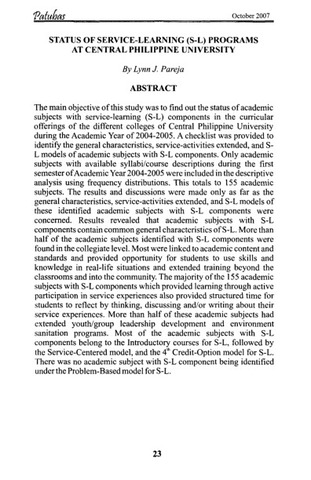Показать сокращенную информацию
Status of service-learning (S-L) programs at Central Philippine University
| dc.contributor.author | Pareja, Lynn J. | |
| dc.date.accessioned | 2021-10-29T05:04:57Z | |
| dc.date.available | 2021-10-29T05:04:57Z | |
| dc.date.issued | 2007-10 | |
| dc.identifier.citation | Pareja, L. J. (2007). Status of service-learning (S-L) programs at Central Philippine University. Patubas, 3(1), 23-38. | en_US |
| dc.identifier.issn | 1908-515X | |
| dc.identifier.uri | https://hdl.handle.net/20.500.12852/1623 | |
| dc.description | Journal article | en_US |
| dc.description.abstract | The main objective of this study was to find out the status of academic subjects with service-learning (S-L) components in the curricular offerings of the different colleges of Central Philippine University during the Academic Year of 2004-2005. A checklist was provided to identify the general characteristics, service-activities extended, and S- L models of academic subjects with S-L components. Only academic subjects with available syllabi/course descriptions during the first semester of Academic Year 2004-2005 were included in the descriptive analysis using frequency distributions. This totals to 155 academic subjects. The results and discussions were made only as far as the general characteristics, service-activities extended, and S-L models of these identified academic subjects with S-L components were concerned. Results revealed that academic subjects with S-L components contain common general characteristics of S-L. More than half of the academic subjects identified with S-L components were found in the collegiate level. Most were linked to academic content and standards and provided opportunity for students to use skills and knowledge in real-life situations and extended training beyond the classrooms and into the community. The majority of the 155 academic subjects with S-L components which provided learning through active participation in service experiences also provided structured time for students to reflect by thinking, discussing and/or writing about their service experiences. More than half of these academic subjects had extended youth/group leadership development and environment sanitation programs. Most of the academic subjects with S-L components belong to the Introductory courses for S-L, followed by the Service-Centered model, and the 4th Credit-Option model for S-L. There was no academic subject with S-L component being identified under the Problem-Based model for S-L. | en_US |
| dc.language.iso | en | en_US |
| dc.publisher | Central Philippine University | en_US |
| dc.subject.lcsh | Service learning | en_US |
| dc.subject.lcsh | Service learning--Evaluation | en_US |
| dc.subject.lcsh | Central Philippine University | en_US |
| dc.title | Status of service-learning (S-L) programs at Central Philippine University | en_US |
| dc.type | Article | en_US |
| dc.citation.firstpage | 23 | en_US |
| dc.citation.lastpage | 38 | en_US |
| dc.citation.journaltitle | Patubas | en_US |
| dc.citation.volume | 3 | en_US |
| dc.citation.issue | 1 | en_US |
Файлы в этом документе
Данный элемент включен в следующие коллекции
-
Patubas [110]
Patubas is a refereed research journal of Central Philippine University.


